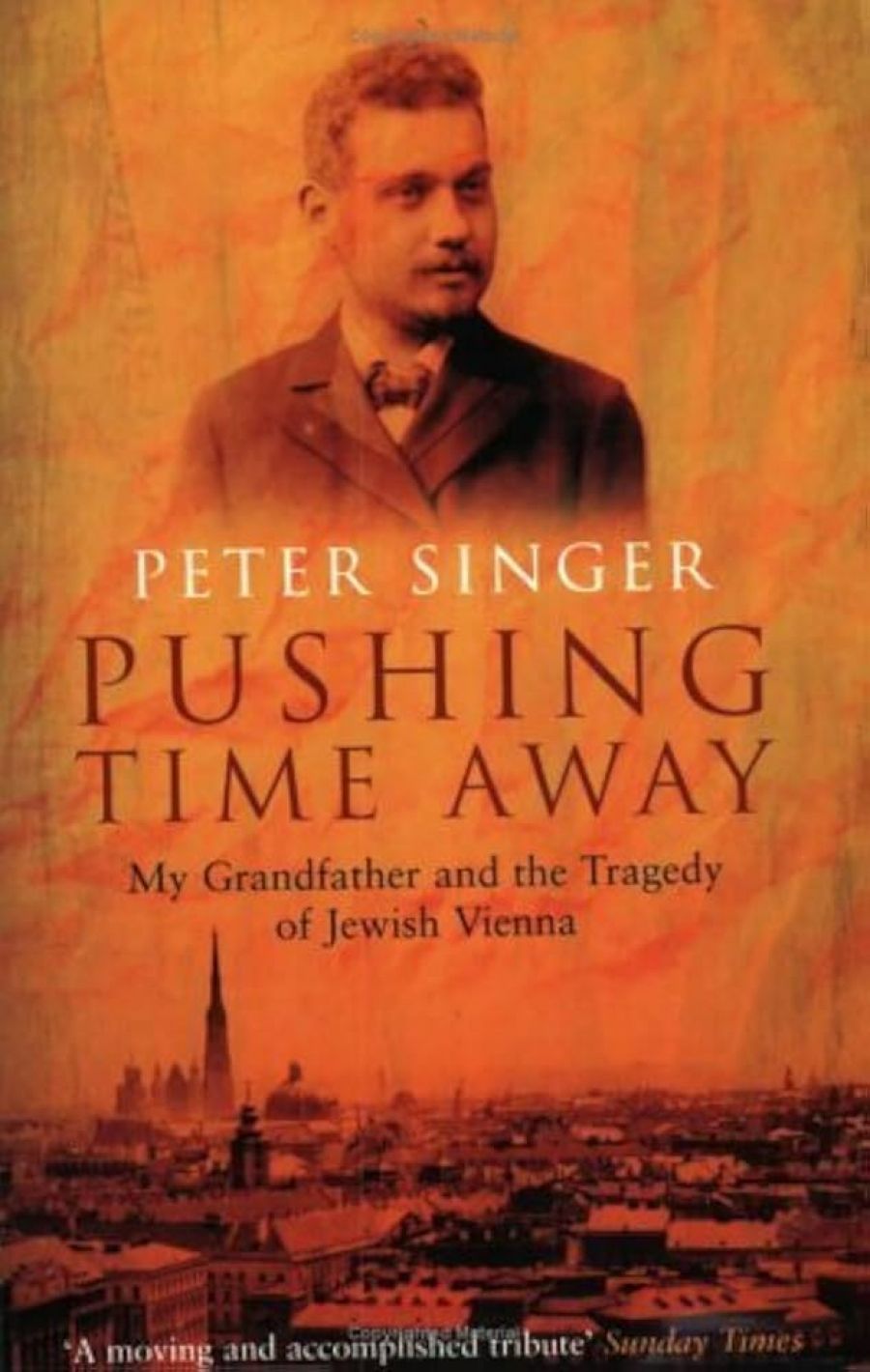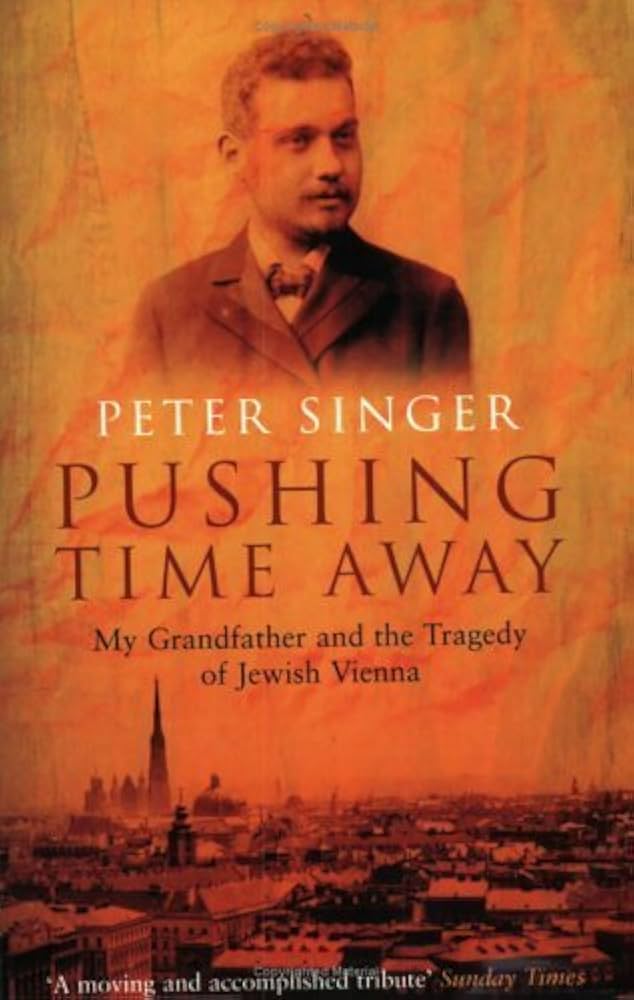
- Free Article: No
- Contents Category: Memoir
- Review Article: Yes
- Article Title: In Search of a Statistic
- Online Only: No
- Custom Highlight Text:
Many of us, as we get older, become curious about relatives we hardly or never knew. Perhaps, if we have children of our own, we become more aware of the biological ties that bind us to those relatives and seek self-illumination through the lighting of the shadowy places in our ancestry. This process is beautifully implied by Peter Singer’s title, Pushing Time Away, a phrase taken from a letter written by his maternal grandfather, David Ernst Oppenheim, to his maternal grandmother, Amalie Pollak, in which Oppenheim declares: ‘what binds us pushes time away.’
Singer never knew his grandfather, but was prompted to discover him on learning that Oppenheim ‘wrote about fundamental values, and what it is to be human’. For Singer, who apparently rather surprised his family by deciding to be a philosopher, this was a spur to enquiry. Moreover, ‘[t]he handful of people who knew my grandfather are getting old’. If anything, indeed, bound Singer and Oppenheim together, it had to be found now, or not at all.
- Book 1 Title: Pushing Time Away
- Book 1 Subtitle: My Grandfather And The Tragedy Of Jewish Vienna
- Book 1 Biblio: Fourth Estate, $29.95 pb, 335 pp
- Book 1 Cover Small (400 x 600):

- Book 1 Cover (800 x 1200):

The book is arranged in five parts, framed by a prologue and an epilogue, which deal with the phases of Oppenheim’s life that Singer has been able to recover: his courtship of Amalie Pollak, as a young student of classics at the University of Vienna; his membership of Sigmund Freud’s ‘Wednesday Group’; his service in World War I; his postwar teaching and writing (including a period of close association with Alfred Adler); and the final years of his life in the Austria annexed by Nazi Germany.
Through his letters, quoted extensively by Singer, Oppenheim comes across as an intelligent, sensitive but rather insecure man. There are indications, though no details, of an unhappy childhood. His relationship with Amalie appears to have been rather unconventional, by the standards of the time, in that they corresponded with unusual candour and freedom, and seem to have been drawn together initially by a shared flirtation with homosexuality. (Singer, though no homophobe, understandably found this ‘astounding’.) Amalie’s own formidable intellectual gifts are indicated by her record in mathematics and physics. She was only the thirty-ninth woman to graduate from the University of Vienna.
Whatever its origins, the relationship between David and Amalie flourished, and their marriage, on Boxing Day 1906, seems to have been a success. Despite her own academic prospects, Amalie sacrificed her career to her husband’s without any apparent bitterness. Oppenheim became a teacher of classical languages at the Akademisches Gymnasium, while pursuing, in his spare time, his own studies into the nature of the human soul.
A shy and bookish man, Oppenheim was possessed of the strong moral sense common in such men and, it is clear, the much rarer courage to act according to his principles. He broke with Freud, despite the immense boost to his academic reputation the association would have given him, because he could not acquiesce in Freud’s dogmatic and intolerant exclusion of Adler (and anyone else who would not unquestioningly accept the master’s theories). In the late 1920s Oppenheim would break with Adler, in turn, for the same reason. Singer’s grandfather was interested in truth, not cultism.
He was a brave soldier, thrice decorated, and, to many, an inspiring teacher. The writer and critic Friedrich Heer wrote to him in the following terms: ‘You were a teacher through and through your entire life. I think truly a teacher possessed. Possessed by the desire to form unformed shoots and to give them shape, to create form out of chaos, and to create clarity and light out of confusion and fog – to create together with the students.’
Perhaps the most startling example of the impact of Oppenheim’s personal integrity is provided by Albert Massiczek, a friend of Heer’s. Massiczek imbibed anti-Semitic prejudice from childhood, joined the Austrian Hitler Youth at sixteen, and was a member of the SS at the time of the Anschluss. But he quickly became disillusioned with Nazism, joined a resistance group, and recalls his meeting with Singer’s grandparents as follows:
I realized that the words of the Oppenheims carried more weight than mine, more feelings and more experience. Especially the emotional connotations of the terms man, mankind and humanity seemed to me multidimensional. They conveyed warmth and depth and an extension that can only spring from strong human relationships. I began to sense that there was a great difference between the responsibility many Jews felt for their fellow human beings and the irresponsibility that exists among a lot of young non-Jewish people.
David Oppenheim’s miserable death in the Nazi camp at Thieresenstadt is lacerating in its intensity. The prisoners lived on soup with potato and bits of bread floating in it; 1200 of them were housed in an attic on a bare tiled floor; the dead often lay for two days in the room. Singer writes: ‘We all know that six million Jews died, but that is a mind-numbing statistic. I have a chance to portray one of them as an individual.’ He succeeded. If I have a criticism of Pushing Time Away, it is that I don’t know what effect the reconstruction of his grandfather’s life had on Singer himself. But to rescue the Holocaust from the empire of platitude is a signal achievement, and it is perhaps mean-minded to ask for more.


Comments powered by CComment